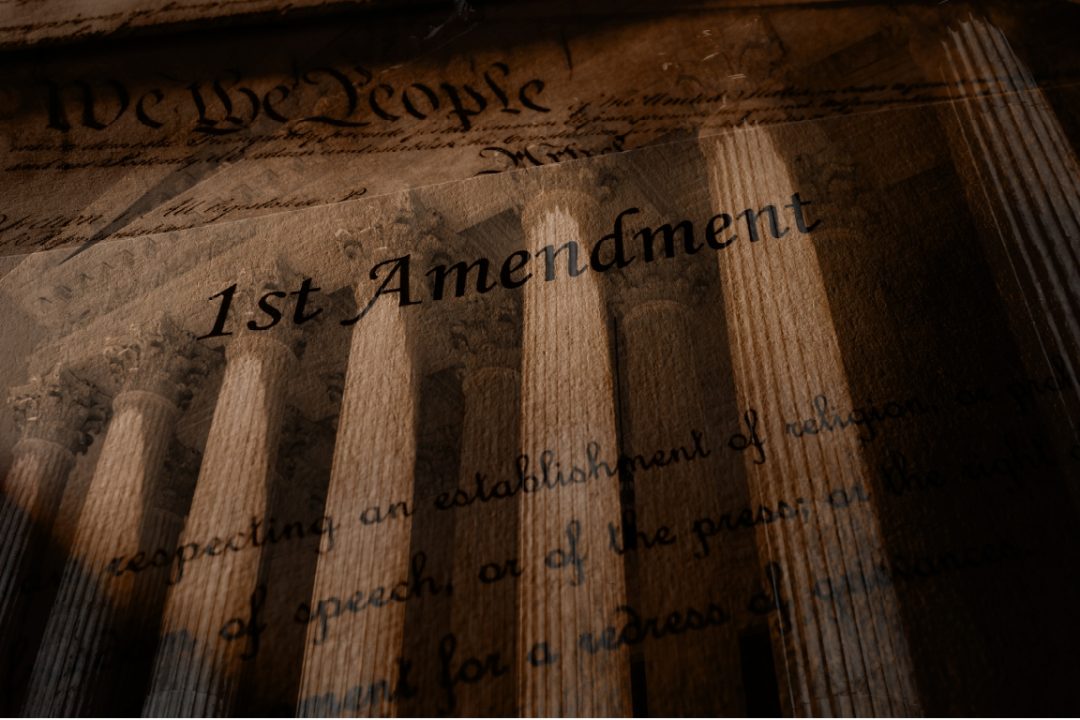
Here’s an interesting test if you have any young people in your life. Ask them to finish the following rhyme: “Sticks and stones may….”
A second question you can pose to the whippersnapper is: Is “hate speech” protected by the First Amendment? (And just hope they know what the First Amendment is.)
The “seasoned citizens,” as Rush Limbaugh used to say, among us will almost assuredly know that the rest of the rhyme goes, “break my bones, but names will never hurt me.” As for “hate speech,” there actually is no such classification under U.S. law. Yet there are Americans who believe otherwise — and that there’s no legally protected right to utter it.
The problem is worsening, too, with young people being the most skeptical about the First Amendment. What’s more, an alarming percentage of Americans actually believe the amendment should be rewritten.
Fettered Tongues
It was a generation ago now that I wrote the essay “How We Will Lose Our Freedom of Speech.” And while we haven’t lost it yet, we are still on a troubling trajectory. A new study may bear this out, too. As Reason magazine reported Thursday:
The 2025 Future of Free Speech Index [FFSI], based on surveys conducted in 33 countries, places the United States ninth globally in free speech support — a respectable but hardly exceptional position. More concerning is the trajectory: The U.S. has experienced the third-largest decline in support for free speech since our previous survey in 2021, behind only Japan and Israel.
This phenomenon is part of a broader “free speech recession” happening globally, with twice as many countries showing substantial decreases in support for free expression as showing increases.
But America’s retreat is particularly notable given its unique constitutional protection and self-conception as free speech’s foremost defender.
Free Speech — or Free-for-me Speech?
Interestingly, the five nations in which people express the most free-speech support are Norway, Denmark, Hungary, Sweden and Venezuela. This is ironic because all those countries have “hate speech” laws. And this reflects two phenomena. For starters, there’s Duke’s First Rule of Politics:
“Under representative government, people do not get what they want. They get what they vote for.”
(Note, though, that in Venezuela elections are stolen.)
And, of course, people’s conception of what they’re voting for doesn’t always reflect what they’re actually voting for.
The second phenomenon is similar: People’s conception of free speech doesn’t always reflect actual free speech.
After all, “The devil is in the details.” “Free Speech” looks great to many on the product’s beautiful packaging. But when people are confronted with what’s on the ingredients label, they may balk — even when it lists nation-strengthening elements.
The FFSI noted this phenomenon, too. As its authors write:
Most nations show high levels of support for free speech in the abstract, but support is lower and more divided when it comes to statements that are offensive to minorities or one’s own religion, supportive of homosexual relationships, or insulting to the national flag.
And a Child Shall Lead Them — Into Tyranny?
But then there’s the matter of America’s free-speech-recession-oriented “generational divide.” As Reason also relates:
Young Americans (ages 18 to 34) now show significantly less tolerance for controversial speech than their elders across every category we measured. The magnitude of these shifts since 2021 is remarkable:
・Support for allowing statements insulting the national flag has plummeted 28 percentage points among young adults.
・Willingness to tolerate speech supporting homosexual relationships has dropped 20 points.
・Acceptance of speech offensive to minority groups has declined 12 points.
・Tolerance for speech offensive to one’s religion has fallen 14 points.
In contrast, the views on free speech of Americans 55 and over have remained relatively stable since 2021.
Digging More Deeply
There’s much to unpack here. First, the decline in “tolerance” for the aforementioned viewpoints likely reflects, in part, culture-war-induced exasperation. Yet there’s also the matter of confusion over tolerance’s meaning and the government’s role vs. that of the social sphere.
As I’ve often emphasized, “tolerance” always involves the abiding of a perceived negative. In other words, you wouldn’t have to tolerate a beautiful car or delectable meal; you relish such gifts. But you would have to tolerate foul weather, a stubborn cold, or a health regimen you must follow but detest. What does this mean for speech?
Well, people don’t always want to hear Truth. So when unwelcome Truth is being spoken — or when unpopular speech merely expresses taste — it’s good that those disliking it have to tolerate it.
When lies are being spread, however, it’s a different matter. But there’s the rub:
People often have trouble distinguishing between Truth and lies. Our government is certainly no better, either. This is why it shouldn’t be allowed to play Ministry of Truth.
The Other “Government”
Yet social laws can and should come into play, sometimes, when governmental laws don’t. For example, though we should all say “please” and “thank you” when appropriate, we don’t want this enforced by law. This doesn’t mean, however, that a profoundly rude and nasty person shouldn’t perhaps be shunned and ostracized.
Even more significantly, the same fate can be visited on activists, under a certain condition. That is, when their agenda is definitively determined to be not just be a perceived negative, but an objective one. We do this with unabashed Nazis, for example, and should do it with devout Marxists — and with “trans”-agenda advocates, too. (It’s the only way that destructive movement will return to the closet.)
Realize, too, that stigmas are corollaries of values, and that certain things in society will be valued.
This means certain things will be stigmatized.
It’s just a matter of what they’ll be: lies or the Truth.
The Wrong Direction
And for sure is that to an extent, Truth is being stigmatized, along with our First Amendment. In fact, a 2019 poll found that a slim majority of Americans (51 percent) wanted the First Amendment rewritten to “reflect the cultural norms of today.” Moreover, 54 percent of Millennials wanted “hate speech” made a crime — and violators imprisoned.
Is this surprising? Kids today are rarely taught the sticks-and-stones rhyme, which, while not true in every sense, engenders respect for free speech. Instead, as the John Stossel video below relates, they’re instructed that they’re “fragile” and that words can cause “permanent damage.”
The reason, by the way, why the rhyme isn’t true in every sense is that words can in fact hurt us. For example, telling people they’re fragile and that words can cause damage is damaging respect for our First Amendment and our sense of what’s good. It seems a paradox, perhaps. The proper course of action, too, isn’t to encourage government censorship of the people, but virtue in the people.




